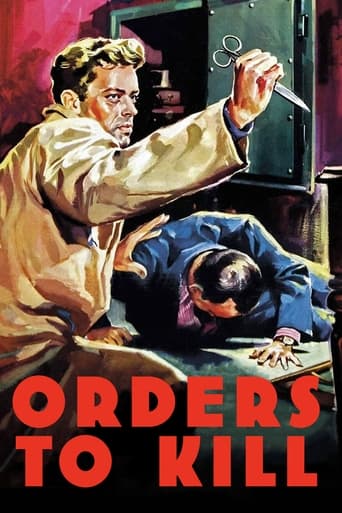writers_reign
Every Sunday in the UK Talking Pictures, a fairly new channel that screens only movies, publishes its schedule for the next seven days and I go through it checking titles I want to see; when I saw Orders To Kill I thought it would be well worth missing but then I noticed that it was directed by Puffin Asquith which made it almost obligatory. Asquith was responsible for some of the cream of British movies and forged an excellent writer-director partnership with Terence Rattigan, making him arguably THE English director of the 20th century despite Carol Reed and David Lean enjoying higher profiles. I wasn't disappointed; Orders To Kill is a fine movie with a moral question at its core. In brief; a man is recruited to kill a resistance worker suspected of treachery in World War II. The assassin undergoes training, is given a new identity and parachuted into France. Having met the target by chance he bonds with him and decides he is innocent, says as much to his 'contact' who reminds him he is under orders. He kills the target who, it turns out, is innocent. Irene Worth runs away with the picture as the 'contact' whilst newcomer Paul Massie succeeds in conveying the moral dilemma in which he finds himself. One of Puffin's finest.
Leofwine_draca
ORDERS TO KILL looks and feels like a straightforward wartime thriller at the outset. It features Paul Massie (the Canadian actor best known for playing the lead in THE TWO FACES OF DR. JEKYLL, a role he no doubt got on the strength of his fine conflicted performance here) as an American agent who is parachuted into occupied France to take down a French traitor whose association with various resistance fighters has seen many of them die.During his early training scenes with the delightfully gruff James Robertson Justice, Massie seems like the ideal man for the job. Things are a little different in the field: he soon finds himself questioning the man's guilt, and ORDERS TO KILL becomes a very different type of film all of a sudden: an intense 'moral dilemma' movie which puts the protagonist and the viewers through the ringer.The only fault I can find with this film is that it's slightly overlong and some of the early scenes drag a little. Otherwise, it's a delight, and a surprisingly mature and brutal effort for the era. Some of the scenes are so suspenseful and disturbing that they're almost unwatchable. An exemplary supporting cast really add to the authenticity of the piece, but the whole thing hangs on Massie's shoulders and he doesn't disappoint; I think it's fair to say that he peaked early in his career and was never better than here. ORDERS TO KILL is a fine thriller without a single action scene in it to distract from the storyline.
dbdumonteil
This movie ,in spite of its tragic plot,shows Asquith's infatuation with France :not only the hero is served a delicious quiche Lorraine in one of the first scenes ,but he also used an old French song from long ago;besides, the stand out of his work is arguably English actor Leslie French(!) ,really admirable in the scenes with his pussycat,the victim who can ask why ,unlike the people who die during the bombings .There is also a strange use of this old French folk song from 1792 ,"Cadet Rousselle":no,it's not a Chanson about Revolution;it actually makes its hero an object of ridicule:the first lines go like this: "Cadet Rousselle A Trois Maisons Qui N'Ont Ni Poutres Ni Chevrons " "Cadet Rousselle has got three houses which have neither beams nor rafters (...)it's to put up the swallows..)This choice may be bewildering for a French viewer who may wonder whether they did not choose stuff like " Auprès De Ma blonde" ;probably because the dear lady who taught our hero the FRench language taught him this song and to both of them ,it's a dear memory.That said ,it's disappointing that French is almost never used in France ,even when the Parisians speak between them.The first third,including training with James Robertson Justice ,is a bit slow-moving ,and Mrs Lilian Gish is wasted ;but the movie hits its stride in the second third and grabs the viewer till the end .The principal,Paul Massie, gets good support from Irene Worth as Leonie ,a woman war has hardened ,and particularly Leslie French,whose very moving performance was hailed by French critic Jean Tulard .The screenplay puts the blame on the absurdity of war ;the victim loves cats ("but so does Himmler" Leonie hastens to add).The famous proverb " you can't make an omelet without breaking eggs" does not give a meaning to what he did .You will not forget the little girl who played Cinderella's wicked sister ,and ,in real life ,had to play the part of an orphan of the war.
cmwatson
I saw this move perhaps 40 years ago, during the height of my interest in espionage and spy tradecraft. I remember being mesmerized by the gritty reality of this movie and the fine portrayal of the agent/assassin as played by Eddie Albert. It remains what is perhaps one of his most serious roles, and the film reveals a side of his talent rarely revealed in his other movies. Every detail of the film, from mission preparation through to the conclusion, was exceptionally well done. I would love to find a copy of this somewhere; it remains a personal favorite.


